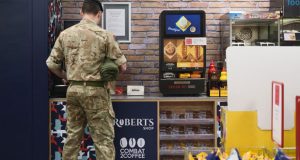
Formerly, she spent 14 years as a Principal Consultant at BSRIA, inspiring her team to provide independent consultancy services that have improved building operational performance around the globe.
Here Harris explains how she entered the profession via an engineering background, the importance of mentors, why wellbeing has now become a preserve of FM and how technology is going to help, not hinder our careers.
FM IS ABOUT MANAGING
When I left school, I didn’t want to spend the rest of my life behind a desk, I wanted to do something practical. So, I entered engineering at Mars confectionary in one of their factories, which enabled me to study day release at a local technical college. I was one of just four girls out of 80 apprentices that joined the technical college that year.
Back then, if a woman chose engineering as a route into FM you constantly had to prove yourself. Of course, today there’s much more to FM than engineering. Facilities management is about managing. It is running and organising people and resources efficiently and effectively. A technical background is very helpful but not a necessity – you need common sense and problem-solving skills but those can be learnt. I wholeheartedly recommend it as a career.
QUALIFYING THE HARD WAY
After I finished my apprenticeship I made a few career moves to broaden my experience. Then, I made a big leap into consultancy at BSRIA. I thought that the level of knowledge and experience that I had built up would enable me to support others implement best practice. My plan worked out well, and I spent the next 14 years there as a consultant. BSRIA was also where I got my masters in Facilities Management, which opened the door to chartership with RICS.
Throughout my career I have felt the need to continue my education, but in hindsight I did it the hard way. From being an apprentice, with just one day of college a week, I worked on through my ONC, HNC, HND, degree and finally my masters, which I did with two kids under the age of five. It was hard work, but it was well worth it.
When I was recruiting for BSRIA I noticed a trend where women aspire to higher qualifications. The women that I encountered usually had PHDs and masters qualifications, while the men I interviewed were content with just a degree. I think this is closely linked to the need to prove ourselves. I believe that academic qualifications can do that, and support our desire to take on more responsibility.
WORK WITH MENTORS TO BUILD CONFIDENCE
The one thing that really helped me to build confidence was working with mentors – both male and female. They definitely encouraged me to take on responsibilities that, without their help, I would have naturally shied away from.
At one point, early in my career, I remember being particularly anxious about an important project. My mentor enabled me to reach deep inside to get it done. I just needed someone to say ‘you can do this Jo’ for me to realise that yes, actually I could. That was a turning point for me. So, find a good mentor and believe in yourself.
CHANGING LIVES THROUGH FM
What gets me out of bed every morning? It’s the promise that FM can change people’s lives for the better. If I can make the difference between a scientist at Eli Lilly worrying about being cold or concentrating on their research because they are comfortable, then I am satisfied.
As I see it, FM has evolved over the past few decades to be concerned not only with workplace productivity but also health and wellbeing – which actually boils down to the same thing. If we can get occupiers, those actually doing the day-to-day work, into a good place both mentally and physically then they will be more productive. So, everybody benefits.
NEW TECHNOLOGY WILL ENHANCE OUR ROLE
New technology will help facilitate this trend for occupier wellbeing – we are going to get ‘smarter’ through the use of smart technology and the data that it provides. Sensors around a building will give us intelligence about the way in which people work, so we will know, for example, if someone is at risk of being uncomfortable, before they begin to feel uncomfortable.
My view is that technology is going to enhance the role of facilities managers, rather than replace us. For example, I think it is unlikely that we are going to see air conditioning maintenance robots any time soon. However, technology can tell us when equipment is not running efficiently and trigger the human intervention required with a maintenance visit. So, technology will result in tasks being scheduled or automated, enabling us to better use our limited resources.
WHAT DOES BEING A FELLOW OF RICS MEAN TO YOU?
Compared with other professional memberships my RICS Fellowship is definitely of value. The fees are not insubstantial, but that means that anyone who renews has to be very serious about FM as a sector and as a profession. I have never met a RICS member I have been disappointed in. I cannot say that for other institutes and professional organisations.
FACILITIES MANAGEMENT AS A CAREER CHOICE
Whatever your gender, FM is a wonderful career choice. I have certainly had a fantastic time and have found it very rewarding. Just be confident in your abilities, and be sure to rise to any challenges.




